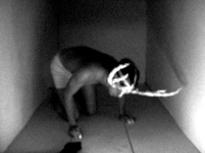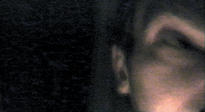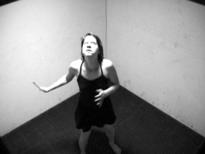WIM CATRYSSE - WITNESS LISTEN .... AND SIGN AS HAVING SEEN
EXHIBITION
With Witness listen... and sign as having seen, Wim Catrysse (1973) had his first solo exhibition. With the title he gave the audience some kind of manual. By addressing the spectator as a witness, Catrysse wanted him to be well aware of his watching, experiencing something. The six sets stimulated this becoming aware in different ways. By building a new space in the former warehouse where argos has its seat, the artist created a very manifest here and now, in which the visitor had to choose his own position. Although seemingly, the way that happened was not casual or arbitrary. How the spectator had to find his relation to the surroundings was fixed, determined: by the artificial space as well as by the line up of the video projections. This way he became a part of the image, and at the same time was pushed out by that same construction, as it emphasised the object/subject -position he found himself in. This all seems evident, but turned out not to be when the spectator was within the construction.
Something similar happened in the videos. They too could be thought of as an inquiry into the relationship between the body and its surroundings. Si ça vous arrive ce soir (1999) showed the close-up of a face in which wide opened eyes and a tight shut mouth were most noticeable. The image changed irregularly into what seemed like its reflection, this time with the mouth wide open. It was not the picture itself that was disturbing but the abrupt variation of silence and sound, commotion and peace. What you thought you see was a completely different picture and you missed a transition, a context. The same lack of information returned in Deer-Stalking (1996), which showed a vague figure, with antlers or horns, in irregular stroboscopic light. You saw just enough to know he’s there, and just not enough to figure out what he is doing there. Catrysse’s work sharpens the spectators senses to find out they are insufficient. To see you have to believe.
The attention paid to the failure or the shortcomings of the body is a repeated motive. It showed up also in Unmastered Behaviour (2000) in which several different characters are vainly trying to keep their balance. Catrysse’s attention for the (human) body -and its relation to the space around it- has its roots in his past as an actor in theatre. There the live presence of the event is the core of the matter. However the videos are never just recordings of a performance: they show a strong awareness of the possibilities and features of the medium. The link is made by challenging the body, the spectator’s as well as the actor’s. Disorientation and discomfort: that’s what Catrysse is after in his work.
Something similar happened in the videos. They too could be thought of as an inquiry into the relationship between the body and its surroundings. Si ça vous arrive ce soir (1999) showed the close-up of a face in which wide opened eyes and a tight shut mouth were most noticeable. The image changed irregularly into what seemed like its reflection, this time with the mouth wide open. It was not the picture itself that was disturbing but the abrupt variation of silence and sound, commotion and peace. What you thought you see was a completely different picture and you missed a transition, a context. The same lack of information returned in Deer-Stalking (1996), which showed a vague figure, with antlers or horns, in irregular stroboscopic light. You saw just enough to know he’s there, and just not enough to figure out what he is doing there. Catrysse’s work sharpens the spectators senses to find out they are insufficient. To see you have to believe.
The attention paid to the failure or the shortcomings of the body is a repeated motive. It showed up also in Unmastered Behaviour (2000) in which several different characters are vainly trying to keep their balance. Catrysse’s attention for the (human) body -and its relation to the space around it- has its roots in his past as an actor in theatre. There the live presence of the event is the core of the matter. However the videos are never just recordings of a performance: they show a strong awareness of the possibilities and features of the medium. The link is made by challenging the body, the spectator’s as well as the actor’s. Disorientation and discomfort: that’s what Catrysse is after in his work.



-
za 13.1.2001
- za 24.2.2001
-
Praktische info
Location:
argos
Opening hours:
Tuesday to Saturday, 12:00 to 19:00
Entrance fee:
free - Kunstenaars
-
ARGOS PUBLICATIES